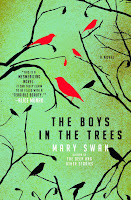 I remember reading an interview with Ann Patchett this past year (and please don’t ask me to find the reference; I have no idea where I found it) where she said something about each of her novels being somewhat the same in terms of their plot and premise. In a sense, she said, she keeps writing the same books over and over again. When it comes to writers as skilled as Patchett, exploring the same themes, working through similar plots, doesn’t detract from the quality of her prose, and I feel like this is the same with Ian McEwan.
I remember reading an interview with Ann Patchett this past year (and please don’t ask me to find the reference; I have no idea where I found it) where she said something about each of her novels being somewhat the same in terms of their plot and premise. In a sense, she said, she keeps writing the same books over and over again. When it comes to writers as skilled as Patchett, exploring the same themes, working through similar plots, doesn’t detract from the quality of her prose, and I feel like this is the same with Ian McEwan.
So many of his novels begin with an event that forever impacts the lives of his characters, and you can see that pattern in Saturday, On Chesil Beach, and Atonement. The set-up for Enduring Love would fit as well: Joe Rose steps out of his everyday life to jump into action (a balloon accident; a boy hovering towards death; a helpless tragedy) and this act of altruism ends up changing the course of his life forever. It was a happy moment, a reunion, Joe’s lover, Clarissa, had just returned from a trip to the US and the two were in the park for a picnic. They were about to pop the cork on the champagne when the pair noticed the trouble with the giant helium balloon. The novel starts: “The beginning is simple to mark.” And it’s true: a hulking, and at times literal, metaphor dropped into the beginning, middle and end of the novel in the form of this balloon, meant to symbolize the tenuous state of life’s expectations: they’re blown off course, trumped by tragedy and then chased by a slightly insane man.
As the balloon teeters away, Joe loses hold of it, and runs to help the one man left hanging on (who soon falls to his death), but before he gets there, he’s faced with the odd character Jed Parry. Joe’s life, up until this point, was happy with the usual adult disappointments (his career isn’t what he expected). But the moment Jed becomes fixated upon him, the constructs that kept Joe tethered to his reality, his relationship with Clarissa, his work, his own grasp on his particular existence, fall apart. The further obsessed Jed becomes with Joe, the more Joe copes in ways that feel unnatural to his personality.
One of the blurbs on the cover of my edition says, “Utterly thrilling… as riveting at the finish as it is at the start,” The Globe and Mail, and I’d have to agree. I read the novel in about three hours and simply couldn’t put it down. I loved Joe’s work as a science writer, found Clarissa’s work with Keats reminiscent of one of my favourite good/bad movies of all time, Possession, and didn’t once feel at all like the action was either forced and/or contrived. McEwan, one of the English language’s most skilled novelists, has a way with these dramatic situations, he can use an almost clinical eye to pull them apart from every direction, exploring the impact upon his characters like a coroner would do a cadaver. Enduring Love wholly deserves its place on the 1001 Books list. I’m not sure every single one of McEwan’s novels should be there (I do question Amsterdam but only because I think it’s an utterly forgettable book) but I’m glad this one is, if only because it gave me the chance to read it.
READING CHALLENGES: Another of my “lost” 1001 Books from the master list for 2009. We’re still 12 hours away from the new year and I’m already two books into my 66 book challenge. The odds are looking good for me to make quite a dent in it over the year! Fingers crossed, indeed.
WHAT’S UP NEXT: I’m about to clean out the last upstairs closet (finished the one in the bedroom yesterday) where boxes and boxes of books are hidden. I want to go through these ones too for 1001 Books that I know I have an haven’t finished (Moby-Dick, I’m looking at you) so that I can put them all on the right shelf and update the online list. God, I am LOVING this week off.





